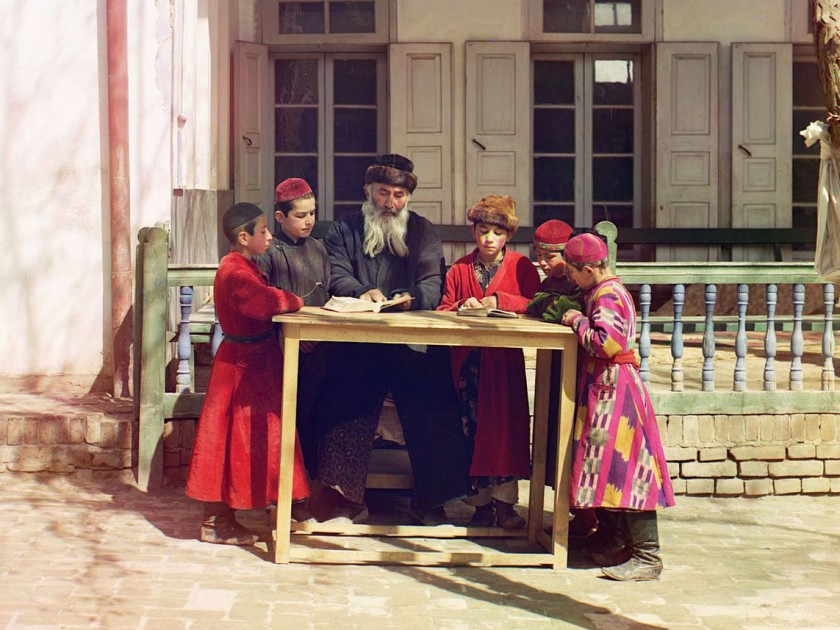Join a community of readers who are committed to Jewish stories
Sign up for JBC’s Nu Reads, a curated selection of Jewish books delivered straight to your door!

Jewish children with their teacher in Samarkand, early 1900s
Sergei Mikhailovich Prokudin-Gorskii Collection (Library of Congress)
That Jews are “people of the book” is well known. What is less acknowledged, however, is that we are also the “people of the book club.”
Reading and studying are ingrained into our religious and cultural fabric. Many Jews — whether observant, secular, or somewhere in the infinitely gradated spaces between — cling to books as sources of strength and wisdom. In the most recent Pew Study of American Jews, over half of US Jews say that being intellectually curious is an essential part of what being Jewish means to them. Many Jews look to the written word for guidance from Torah, the weekend edition of the New York Times, to Twitter.
Jews often read in conversation with others, wherever they’re seeking out the written word. The weekly Torah portion or a recent, controversial editorial are not simply fodder to be absorbed by the individual reader, but content to spark a dialogue. Reading might be an individual activity, but for Jews, it takes on a communal dynamic.
The idea of reading in a social context has a longstanding form: book clubs.
Book clubs help address two converging challenges of our times: how do we focus in a world of fast-paced media? How do we find commonality when the cultural offerings are so diffuse?
The pandemic brought both to the fore. With our isolation, we lost our traditional modes of gathering and connecting, sometimes becoming isolated and lonely. With increased time at home for the privileged among us, we also confronted the challenge of choosing how to fill our time — often it was easiest to head to Twitter and swim in its infinite sea of 280 character thoughts.
Book clubs are a tool to solve these challenges; they allow for a group of people to come together and connect over a shared reading experience. These meetings often lead to in-depth and meaningful engagement, and a step away from the digital world. Book clubs have seen a rise in popularity during these unprecedented times, and they seem to possess a unique property that more and more of us cling to. For some, the social aspect is primary and the text is secondary.
It is not simply that we as a people love books, but rather that through books we build a rhythm into life’s chaos and bind ourselves to one another.
Jewish tradition has long recognized the power of coming together over a text. We come together to discuss the themes, lessons, values, and stories that emerge and give our lives meaning — every week with the Torah portion, every day with Daf Yomi (the seven-year cycle of reading a page of Talmud every day), and during the time between Passover and Shavuot when many Jews read Pirkei Avot.
We do not always read it in the same way. Numbers Rabbah tells us there are seventy faces of Torah, emphasizing the elasticity of this text. But through it all, we are collectively in the longest running, international book club. And we do it together.
Rabbi Meir Shapiro, the Polish rabbi who created Daf Yomi,captured this magic when he said:
What a great thing! A Jew travels by boat… from Eretz Yisrael to America, and each day he learns the daf. When he arrives in America, he enters a beis medrash [a study hall] in New York and finds Jews learning the very same daf that he studied on that day, and he gladly joins them. Another Jew leaves the States and travels to Brazil or Japan, and he first goes to the beis medrash, where he finds everyone learning the same daf that he himself learned that day. Could there be greater unity of hearts than this?
It is not simply that we as a people love books, but rather that through books we build a rhythm into life’s chaos and bind ourselves to one another.
Book clubs do the same: they allow people to come together and build connections across geographical and ideological divides. Even when we cannot find much to agree on or space to gather, we can read together.
Rabbi Joshua Mikutis is JDC Entwine’s Director of Design and Jewish Learning and the Rabbinic Director of the Weitzman-JDC Fellowship in Global Jewish Leadership at HUC-JIR.